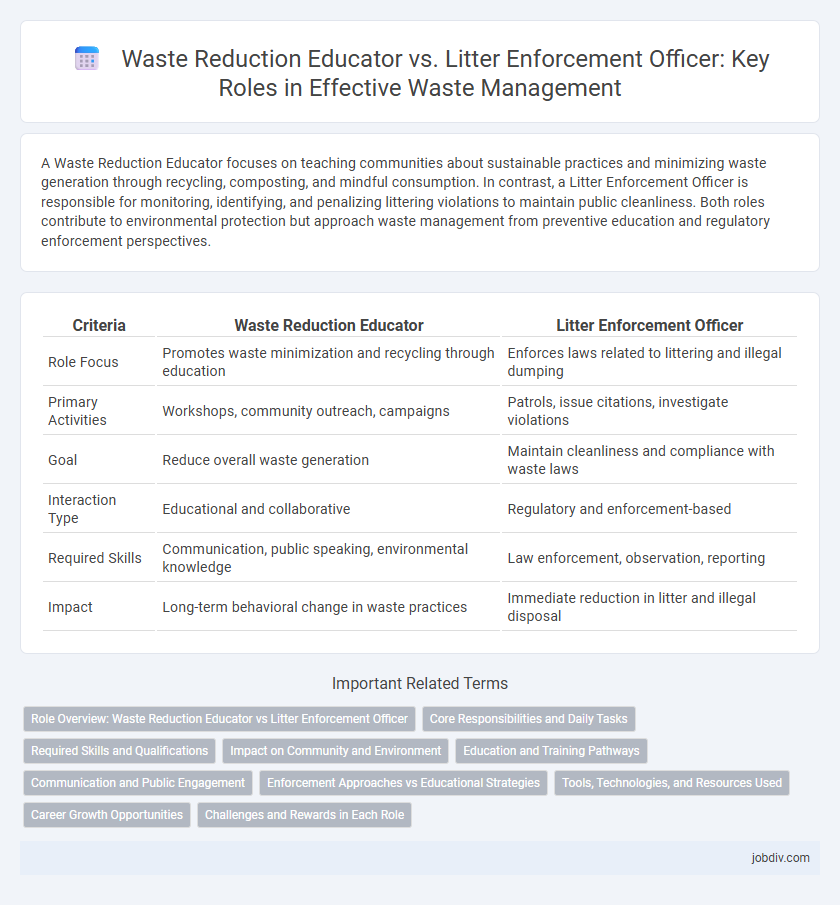A Waste Reduction Educator focuses on teaching communities about sustainable practices and minimizing waste generation through recycling, composting, and mindful consumption. In contrast, a Litter Enforcement Officer is responsible for monitoring, identifying, and penalizing littering violations to maintain public cleanliness. Both roles contribute to environmental protection but approach waste management from preventive education and regulatory enforcement perspectives.
Table of Comparison
| Criteria | Waste Reduction Educator | Litter Enforcement Officer |
|---|---|---|
| Role Focus | Promotes waste minimization and recycling through education | Enforces laws related to littering and illegal dumping |
| Primary Activities | Workshops, community outreach, campaigns | Patrols, issue citations, investigate violations |
| Goal | Reduce overall waste generation | Maintain cleanliness and compliance with waste laws |
| Interaction Type | Educational and collaborative | Regulatory and enforcement-based |
| Required Skills | Communication, public speaking, environmental knowledge | Law enforcement, observation, reporting |
| Impact | Long-term behavioral change in waste practices | Immediate reduction in litter and illegal disposal |
Role Overview: Waste Reduction Educator vs Litter Enforcement Officer
A Waste Reduction Educator focuses on promoting sustainable habits and providing educational programs to reduce waste generation at the source. In contrast, a Litter Enforcement Officer is responsible for monitoring compliance with litter control laws, issuing fines, and enforcing penalties to prevent illegal dumping and littering. Both roles aim to improve environmental quality but emphasize prevention through education versus regulation and enforcement actions.
Core Responsibilities and Daily Tasks
Waste Reduction Educators focus on promoting sustainable practices through community outreach, educational workshops, and developing programs aimed at minimizing waste generation. Litter Enforcement Officers are responsible for monitoring public areas, enforcing anti-littering laws, issuing citations, and collaborating with local authorities to maintain cleanliness. Both roles contribute to environmental protection but differ as educators emphasize prevention and behavior change, while enforcement officers prioritize compliance and regulation.
Required Skills and Qualifications
Waste Reduction Educators require strong communication skills, a background in environmental science or education, and the ability to design and implement community outreach programs. Litter Enforcement Officers need knowledge of local waste regulations, attention to detail for identifying violations, and skills in conflict resolution and report writing. Both roles benefit from a commitment to sustainability and experience with public interaction.
Impact on Community and Environment
A Waste Reduction Educator fosters sustainable habits by teaching communities effective recycling, composting, and waste minimization techniques, leading to long-term environmental benefits and reduced landfill usage. In contrast, a Litter Enforcement Officer focuses on immediate compliance by issuing fines and citations to deter illegal dumping and littering, which helps maintain public cleanliness and prevent localized pollution. Together, their roles complement each other by combining proactive education with regulatory enforcement to enhance community health and environmental protection.
Education and Training Pathways
Waste Reduction Educators focus on community outreach and behavior change by developing educational programs and workshops aimed at promoting sustainable waste management practices. Litter Enforcement Officers primarily undergo training in environmental regulations, legal frameworks, and enforcement techniques to monitor and penalize illegal dumping and littering activities. Education pathways for Waste Reduction Educators often include degrees in environmental science, sustainability, or education, while Litter Enforcement Officers typically receive specialized certification in environmental law enforcement and hands-on field training.
Communication and Public Engagement
A Waste Reduction Educator uses proactive communication strategies to raise public awareness about sustainable practices, emphasizing education through workshops, community events, and social media campaigns. In contrast, a Litter Enforcement Officer focuses on public engagement through direct interaction and enforcement, addressing violations and promoting compliance with anti-littering laws. Both roles are essential for reducing waste, combining educational outreach with regulatory measures to foster community responsibility.
Enforcement Approaches vs Educational Strategies
Waste Reduction Educators utilize educational strategies to promote sustainable behaviors by raising awareness and offering practical solutions for minimizing waste generation, emphasizing community engagement and long-term behavior change. Litter Enforcement Officers apply enforcement approaches by monitoring compliance with waste disposal regulations, issuing fines, and conducting investigations to deter illegal dumping and littering. Combining educational strategies with enforcement approaches enhances overall waste management effectiveness by encouraging voluntary compliance while holding violators accountable.
Tools, Technologies, and Resources Used
Waste Reduction Educators utilize interactive tools such as composting kits, educational software, and community workshops to promote sustainable practices and minimize waste generation. Litter Enforcement Officers rely on technologies including body cameras, handheld citation devices, and GPS tracking systems to monitor compliance and enforce anti-littering laws effectively. Both roles leverage digital platforms and data management systems to enhance outreach, reporting accuracy, and operational efficiency in waste management efforts.
Career Growth Opportunities
Waste Reduction Educators develop community outreach programs and sustainability initiatives, building expertise in environmental education and public engagement that can lead to leadership roles in nonprofit organizations or municipal environmental agencies. Litter Enforcement Officers gain experience in regulatory compliance and public safety through monitoring and issuing citations, with career advancement often progressing toward supervisory positions within law enforcement or environmental regulatory bodies. Both careers offer distinct pathways: educators focus on proactive behavior change promotion, while enforcement officers emphasize regulatory adherence and public order.
Challenges and Rewards in Each Role
Waste Reduction Educators face challenges in changing public behavior and raising awareness about sustainable practices, often requiring creative communication strategies. Their rewards include witnessing community engagement and measurable decreases in waste generation through education programs. Litter Enforcement Officers encounter difficulties in monitoring compliance and issuing penalties, dealing with non-cooperative individuals, but their impact is seen in cleaner environments and direct improvement of local sanitation standards.
Waste Reduction Educator vs Litter Enforcement Officer Infographic

 jobdiv.com
jobdiv.com